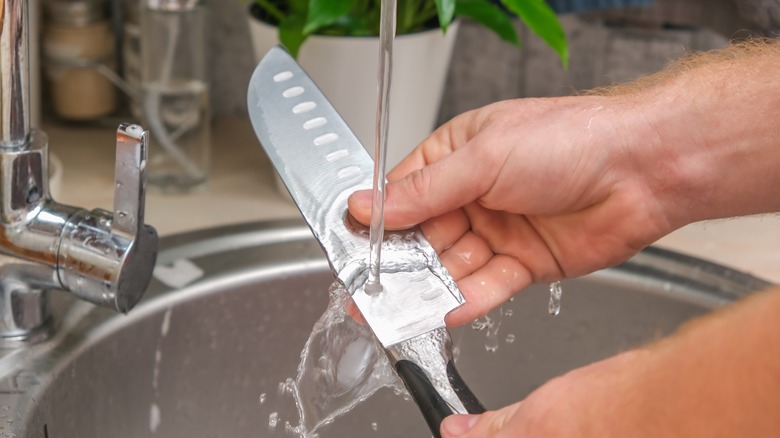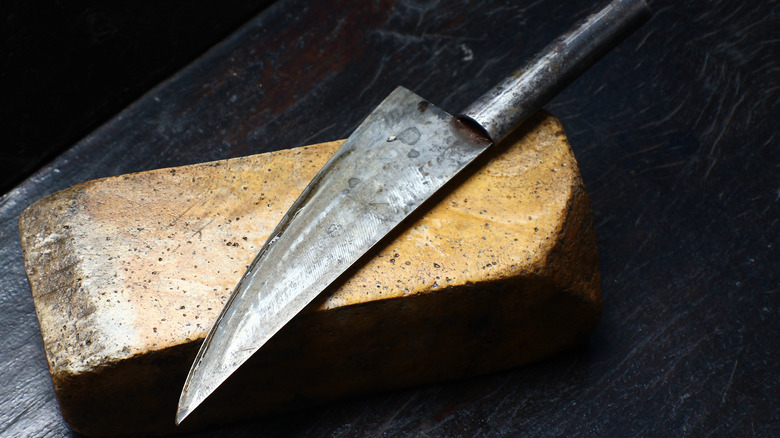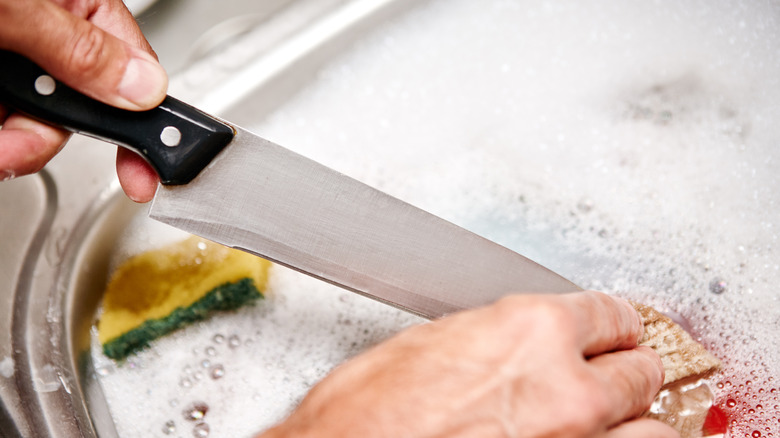Why You Should Never Use Vinegar To Clean Your Kitchen Knives
You've purchased a nice set of knives or inherited some from a family member. Over time, they could look a little discolored, or their blades no longer look shiny. It's certainly possible to clean tarnished knife blades, but you shouldn't use vinegar as a component of the cleaning process. The vinegar could cause damage, including significant corrosion of the metal on your kitchen knives, which would be impossible to repair or maintain.
While you may use vinegar as a versatile cleaning tool for many tasks, from running it through the coffeemaker to wiping down your countertops, the chemical reaction this substance has with knife blades could lead to damage to the finish of the blade, making it weaker over time. Additionally, the acidic makeup of vinegar can actually create pitting on the blade and edge itself, making them far less functional for your needs.
If you have any iron-based knives in your kitchen cabinet, you'll want to avoid significantly long exposure to vinegar. Iron-based and stainless steel knives are susceptible to damage, but aluminum or copper knives can also be damaged. There are simple ways to keep knives clean, though, that can help to restore even the dullest of finishes with a bit of care.
What vinegar does to knives
It's a simple mistake to make. You thought using a natural cleaning agent like vinegar wouldn't be a problem when it comes to cleaning surfaces, including a knife blade. However, after significant exposure to vinegar, you'll notice the knife changing colors.
What's interesting here is that when someone wants to add a patina to carbon steel knives, they do so with the use of vinegar. In other words, for those who want to turn a new knife old, vinegar works. If you want to maintain your knives, on the other hand, you'll certainly want to skip this process, as it can dull the blade and damage the surface. While some people use vinegar to remove rust from their knives, you should still avoid soaking the blades for any length of time. Five minutes is typically long enough to expose a blade to vinegar if you're trying to remove rust.
How to clean knives properly
Your kitchen knives certainly need to be cleaned, especially if they are older or a very good quality set you hope to use for years. Your primary concern when cleaning kitchen knives should be to keep them as dry as possible. Wash them with mild dish soap and warm water to remove food particles and bacteria. This is the simplest everyday cleaning method and works for most surface dirt. Also, note that you shouldn't wash your kitchen knives in the dishwasher due to the prolonged moisture exposure.
One of the most effective ways to clean away the discoloration, tarnish, and patina from knives is to use baking soda. As a bicarbonate compound, baking soda will create a chemical reaction with the oxidized layer on the blade, removing it. A simple soak in baking soda and water can do this, but aim for the least amount of exposure to water as possible. Once the surface seems to be cleaner, rinse off the baking soda fully and dry off the knife.
In addition to these steps, use polishing and sanding as a way to refresh the blades of your kitchen knives. Polishing helps to remove much of the discoloration because it allows for a smooth grain to be restored to the surface. Sanding is more challenging, but it creates a refinishing of the knife itself and could be helpful when the knife is damaged but still in structurally sound condition.


